
On Monday, I headed to Eastern Parkway for my usual walking jaunt at the Labor Day Parade. I took my camera along and elbowed my shots between the line of cameramen. At one irresistible moment, I dived into the crowd to join the Belizean float for Festibel, one of the many organizations that works all summer, planning and costume making, to represent their Caribbean country on the Parkway.
For the Caribbean folk of the city of Brooklyn, the Parkway has become a symbol of our continuing journey farther into places like East Flatbush, with its dollar vans and fish stands and Korean bodegas, Western Unions, roti shops, and stands selling phone cards bearing flags of every Caribbean nation. Even for those of us who live on the outskirts and visit only on special family occasions (and only if food will be served), it represents our journey into urban Caribbean landscape, a jungle where we learn to hustle to one urban rhythm, each man for himself, yet all aware of the fact that we can no longer survive as islands.

For folks in far-away places like Belize, patriotic celebrations are quite different. In a few days, Belizeans at home will celebrate the Battle of St. George's Caye, which celebrates the defeat of the Spanish by the British colonialists back in the late 18th century and, still today, strangely serves as our Independence Day. With some irony, this year, Belizeans will celebrate their long-awaited twenty-fifth anniversary of independence from British rule on the same date as the national holiday that still marks the victory of the British at the Battle of St. George's Caye.
Belizeans are fiercely patriotic, strong believers in their recently-earned independence. They have had to be nationalistic. For over two hundred years, Guatemala has maintained legal claims to Belize's sovereign borders. This cold war continued up until the 1970's, when Belize entered into serious negotiations with Guatemala over the longstanding land claims, and opponents to the Guatemala concessions staged violent demonstrations against government. After much international pressure and negotiations, independence finally came to Belize on September 21, 1981, but without Belize having reached a formal agreement with Guatemala to end the two-century old border dispute. And so the shadow of the Guatemala claim persisted, as did the questions and concerns of many Belizeans about their political identity. (Here I am reminded here of the politics that divided Ghana after Kwame Nkrumah's short rule ended and the political divisions that plague the Rawlings' administration to this day.)
Last year in Belize City, I attended the first of a speakers' series that led me back through this history. The event honored Odinga Lumumba, a freedom fighter, a rare Belizean who fought for freedom outside of his own borders and a leader of the short-lived black power movement in Belize in the early 1970's. Like other freedom fighters of that region and generation (Maurice Bishop, Michael Manley and Rex Nettelford to name a few) Odinga traveled to Africa. He went to Ghana to support the military government of General Ignatius Kutu Acheampong prior to the coup by dictator Jerry Rawlings, and he returned to Belize imbued with a revolutionary spirit.
In the late 1970's, Odinga was one of those who protested the Belizean government's negotiations with Guatemala. As a result, he was jailed for sedition, punished for trying to organize a leftist, nationalist movement in the tradition of Pan-Africanist movements. At the forum, one young speaker shared memories of a bearded, grey, but upbeat Odinga, smiling and waving from the halls of the Belize jail where he was imprisioned as her father handed him packages through the bars. This first and lasting impression of a man who "put Belize first," she said, inspired her in later years to contribute in her own way to the building of a still-young nation.
To me, the tribute to Odinga, coming so soon after nation-wide, teach-led protests against government corruption in Belize - and the traces of a revolutionary spirit that seemed to go beyond Odinga's legacy - suggested that ordinary Belizeans may have finally begun to recognize the complicity between colonial and neo-colonial politics. Maybe, like the Caribbean residents of Brooklyn, Belizeans are finally coming around to the notion that independence is only the beginning - nothing more than a down payment on the benefits of true freedom and global democracy.




